戶外工具
|
This page introduces Japanese hunting knives(剣鉈 -kenata- ・狩猟刀 - syuryoutou -). 
※剣鉈(kenata) / 狩猟刀(syuryoutou) means hunting knife in Japanese. There are significant differences between Japanese hunting knives and other knives in terms of blade structure, manufacturing methods, and steel materials. These differences result in exceptional sharpness and durability. |
|||||||||||||||
| Japanese hunting knives and other knives of blade structure | |||||||||||||||
 Thanks to a uniquely Japanese manufacturing method, we have achieved incredible sharpness and
ease of maintenance. |
|||||||||||||||
| Crafted by Japanese Artisans | |||||||||||||||
 Handmade blades crafted with dedication by skilled artisans with excellent traditional techniques exude a warmth that industrial products lack. The quality of these forged blades is captivating. At our shop, we offer products from "Mr. Komatsu and Mr. Ikeuchi", who are one of the few blacksmiths who have inherited such a secret technique with a history of 400 years. |
|||||||||||||||
| Using Japan’s best of AOGAMI & SHIROGAMI Steel Materials | |||||||||||||||
 The process of attaching steel to soft iron by heating and hammering creates a blade that is easy to sharpen and maintains its edge for a long time. This is achieved through precise hammering techniques and meticulous temperature control. The steel used is the hard and sharp “Japanese steel.” |
|||||||||||||||
|
Made from “Shirogami” and “Aogami” of high-quality YASUKI steel. |
|||||||||||||||
|
|||||||||||||||
| The Joy of Sharpening | |||||||||||||||
 As mentioned earlier, the unique Japanese structure makes it easy to sharpen and maintain. Since sharpness preferences vary, you can customize the blade’s sharpness to your liking by sharpening it with a whetstone. Additionally, when the blade becomes dull, you don’t have to dispose of it; you can sharpen it and continue using it for a long time. |
|||||||||||||||
|
We offer the best tools tailored to various users.
|
|||||||||||||||
|
1.Hunting Life (Survival): 
|
2.Outdoor Camping (Outdoor): 
|
3.Collection Knife (Collection): 
|
|||||||||||||
1.Hunting Life (Survival)A knife that can handle everything from serious hunting to butchering and cooking the game.  Survival / Versatility (Uses)・Butchering・Cooking・Hunting |
|||||||||||||||
|
|||||||||||||||
2.Outdoor Camping (Outdoor)A versatile knife perfect for outdoor activities such as fishing and camping.  Outdoor / Portability (EDC)・Carrying ▶ 100~140mm・Fire starting (feather stick)・Cooking・Pruning, splitting wood |
|||||||||||||||
|
|||||||||||||||
3.Collection (Collection)A valuable knife that hunting knife enthusiasts must not miss.  Collection / The Best Product Combining Quality and Appearance・Appreciation・ Design・Rarity・Japanese Traditional Culture |
|||||||||||||||
|
|||||||||||||||
*Clicking on the product name or image will take you to the product page.
| Product Category | Hunting and butchering | Light work | Pruning | Chopping firewood |
Carving Japanese hunting knife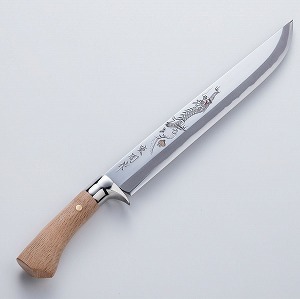 |
〇 | ◎ | - | - |
Tosa Kuro Japanese hunting knife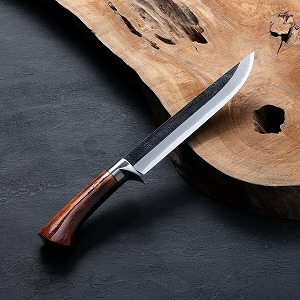 |
〇 | ◎ | △ | - |
Outdoor hunting knife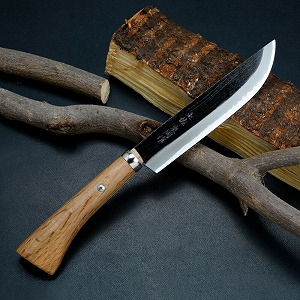 |
△ | ◎ | 〇 | △ |
YAMASHI Polished Japanese hatchet (single edged)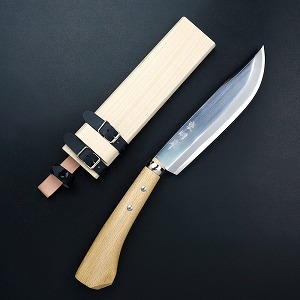 |
〇 | 〇 | ◎ | - |
YAMASHI Polished Japanese (double-edged)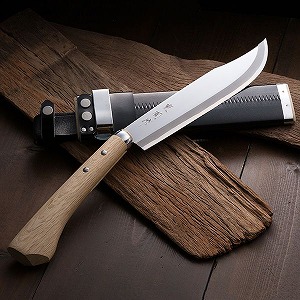 |
△ | 〇 | ◎ | △ |
Japanese Hatchet single bevel |
- | △ | ◎ | - |
Japanese Kurouchi Outdoor Hatchet |
- | - | 〇 | ◎ |
| Blade size (approximate) |
4 to 7 inches (120 to 210 mm) |
8 inches and up (240mm and up) |
||
| Product Category | Hunting and butchering | Light work | Pruning | Chopping firewood |
| Part Of Japanese Hunting Knife | ||||||

|
||||||
|
Below is a list of the blade lengths that will suit the purpose and usage of the sword hatchet.
|
||||||
|
||||||
| Frequently Asked Questions | ||||||
|
How long does the sharpness last? What is the best blade shape for hunting knives? |























